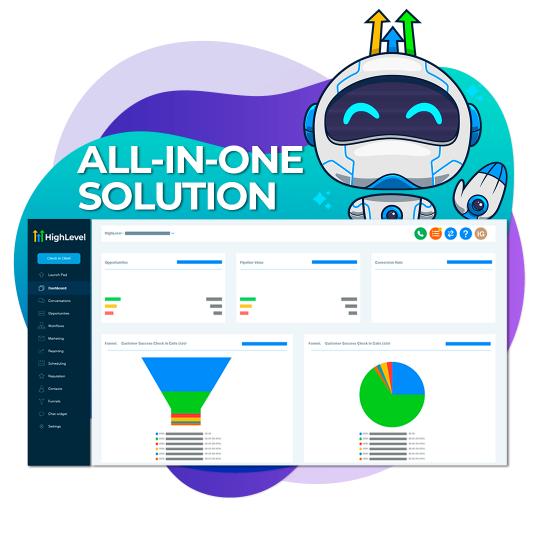Stop Losing Sales Due to Poor Customer Follow-up
When you sell things, you want to be honest with your customers. Think of it like making a new friend – you wouldn't trick a friend! Good marketing is about helping people see how your product can make their life better. Just like you want friends to trust you, customers need to trust your business.
Some companies try tricks to get quick sales. But that's like lying to a friend – it might work once, but they won't trust you again. The best way is to be open and helpful with customers. When you're honest, people come back and tell others about you.
Managing Customer Relationships Made Easy:
- Track every customer conversation
- Never forget to follow up
- Send automatic thank you messages
- See who's ready to buy
- Keep all customer info in one place
Ready to stop losing sales and start growing your business? Try this easy-to-use system that helps you manage customers better. Many business owners see more sales in just 30 days!
Start Your Free 14-Day Trial Now
Key Takeaways
When companies try to trick you into buying things, it can hurt people's ability to make good choices.
Being open and honest with customers helps them trust you. Lying to them will make them not like you anymore.
Hidden costs and tricky website designs are wrong. They make people lose faith in online shopping.
Good marketing helps both the business and the buyer. It does not try to take advantage of people when they feel weak.
Laws help protect shoppers from being tricked. They make sure stores use fair ways to sell things.
Defining Ethical Marketing Boundaries

Marketing should be honest and fair to everyone. It's like making a promise to your friends – you need to tell the truth and keep your word.
When we market things, we must be clear about what we're selling. Think of it like showing someone what's in your lunch box. You want them to see exactly what they'll get.
Good marketing helps people make smart choices. We must be kind and not trick anyone. Just like in the playground, we treat others the way we want to be treated.
When we share about our products, we need to:
- Tell the truth
- Be clear
- Help people
- Treat everyone fairly
This way, people will trust us and want to come back. It's like having good friends who always stick together.
The Psychology Behind Consumer Manipulation
Stores and social media use tricks to make us buy things without thinking too much.
Just like when we get hungry seeing a picture of food, our brains can make us want to buy stuff. When a store says "Only 2 left!" we feel we must buy fast.
When we see a high price next to a lower price, the lower price looks good. These tricks work because our brains like to make quick choices based on feelings rather than slow, careful thinking.
Triggering Impulse Decisions
Shopping Tricks That Make Us Buy
Stores know how to get us to buy things quickly without thinking too much. They use tricks that make us feel certain ways and want to spend money right away.
What Makes Us Buy:
- Our Feelings – When we feel bad, we shop to feel better
- Quick Deals – "Buy now or miss out!" makes us hurry
- Other People – We buy what friends like
- Pretty Things – Nice displays make us want stuff
- Easy Buying – One-click shopping makes it too simple
These tricks work on our brains in strong ways. When stores make us feel excited or worried, we often buy things we don't need. Knowing how these tricks work helps us make better choices with our money.
The stores use:
- Colors that catch our eye
- Signs that make us feel we need to hurry
- Happy people in ads
- Easy ways to pay
- Things that remind us of good times
Smart shoppers take time to think before they buy. This helps them save money and buy only what they really need.
Sick of wasting hours on marketing that doesn’t pay off?
What if you could skip the hard work and still grow your business?
Automate your marketing and see how easy it can be to save time and close more deals.
Discover the simplest way to take charge of your business!
Exploiting Cognitive Blind Spots
Our minds have blind spots that stores use to get us to buy things. When you shop, companies use tricks to make you feel special, like showing you fake reviews or making websites hard to leave.
It's like they know what you want, but they're just using what works on most people. These tricks help stores sell more. But it isn't fair to trick people into buying stuff.
When you shop, you should be free to choose on your own. You can stay safe if you learn how stores try to trick you.
The good news is that some stores want to be more honest now. They want you to trust them for a long time. They now have teams who help make sure ads are fair to everyone.
Dark Patterns in Digital Marketing

Shopping online can be tricky. You start to buy something, but then extra fees pop up when you try to pay. This makes you feel stuck because you spent time picking out what you want.
Some stores try to make you buy fast. They show clocks counting down or say "only 3 left!" They want you to worry about missing out on good deals.
These tricks may help stores make money now. But they aren't nice to shoppers.
Stores should be honest with us and show all costs up front.
Hidden Costs and Traps
Digital marketing can cost more than you first see. Companies may hide extra costs or use tricks to make you spend more money. They might show you a low price at first, then add more charges later. They may even check boxes for you that put more items in your cart.
Some tricks make you feel you need to buy right away. You might see a timer counting down, telling you to hurry. Or it might be very hard to stop a service once you start it.
Many people end up paying more than they want to. When they buy something, they often add extra features that cost more. They might also face surprise fees when their service keeps going.
These tricks hurt trust between people and companies. We all need clear and honest prices. After all, it's not just our money at stake – it's our trust too.
Urgency Exploits Buyer Fears
Companies try to make you buy things quickly by making you worry. When you see a timer counting down or "almost sold out" messages, they want you to feel scared of missing out.
These tricks work like this:
- Timers make you feel rushed
- "Few items left" makes you fear running out
- "Special deal" makes you want to feel special
- "Other people buying" makes you want to join in
Good companies don't use these tricks. They tell you the truth and let you think about your choice. More and more companies now know that tricking people is bad for everyone.
Countdown Clock | What It Does to You
—————–|——————
Timer | Makes You Rush
"Low Stock" | Makes You Worry
"One Time Deal" | Makes You Feel Left Out
"Others Buying" | Makes You Follow the Crowd
Building Trust Through Transparent Practices
Companies build trust by being open and honest. They share both their good days and hard days with their customers. When you see a company being real, you know you can trust them.
Being open means telling people the truth about prices and rules. It means treating people with respect. It means not trying to trick anyone. Instead, good companies tell real stories about who they are.
Being open and honest needs to happen all the time. From posts on social media to talking with customers, a good company stays true to its word. This helps people know what to expect.
Emotional Appeals Versus Rational Decisions

Marketers need to choose how to talk to people – through feelings or through facts. Our brains work in two ways. We can think hard about facts, or we can feel things right away.
Most of the time, our hearts lead the way. We feel first and think later. When we see ads during the day, the ones that make us feel something stick with us more than the ones that make us think hard.
This can be tricky. While touching people's hearts works better, it shouldn't trick them.
Good marketing finds a way to speak to both the heart and the mind. It helps people make choices they feel good about and can explain to others.
Neuromarketing's Impact on Consumer Choice
Marketing experts now understand how our brains make shopping choices better than ever. We often think we make smart, careful choices when we buy things. But really, our feelings guide many of our picks.
New brain science tools help companies learn what people really want, even when they can't say it out loud. In the past, companies just asked people what they liked. Now they can see how our brains light up when we see ads or products.
This new way helps make better ads that speak to our hearts. But it also makes us wonder if companies are being fair. They now know how to touch deep parts of our minds to make us want to buy things.
Behavioral Economics in Marketing

People make choices in funny ways. Smart companies know this and use it to help sell their stuff. They show us what other people are buying. They tell us when things might run out soon. These tricks work even when we don't notice them.
When we shop in stores or look at stuff online, companies try to guide what we buy. They might put a high price next to a lower one to make the lower one look good. They might say "only three left!" to make us want to buy fast.
Some companies use these tricks to fool people. Others use them to help people buy what they really need. The best companies help us make good choices while being honest about what they're doing.
Preserving Consumer Autonomy
We all want to make our own choices when we buy things. Good companies should be clear and honest with us. They should tell us what their products do and keep our personal info safe.
Think of it like a friend who tells you the truth. When stores and brands are honest, we can:
- Know what we're buying
- Keep our private info private
- See all the rules clearly
- Make choices without tricks
Bad marketing uses sneaky tricks to get us to buy things. Good marketing lets us think and choose on our own. When companies treat us with respect, we trust them more. This helps create a fair place for everyone to shop.
Simple Rules for Fair Marketing:
- Tell the full truth
- Ask before taking our info
- Show all costs up front
- Never trick people
When companies follow these rules, we can all make better choices about what to buy.
Long-Term Effects of Manipulative Marketing

Companies that trick people into buying things end up losing our trust.
When we feel fooled by a company, we tell our friends and family about it. Soon, more and more people stop trusting that company.
Now, people want companies to be honest with them. We want them to tell us the truth about what they sell.
This has changed how companies must talk to us if they want to keep selling their products.
Brand Trust Erosion
When you break trust by tricking customers, you hurt your brand for a long time. Being honest matters more than quick sales. Think of trust like a bridge – once it falls, it's very hard to rebuild.
What Happens When Trust Breaks:
- People stop buying from you
- Bad reviews spread fast online
- Other businesses stop trusting you
Your customers remember when you lie to them. They tell their friends. They post about it online. Soon, no one believes what you say anymore.
Sure, tricks might help you sell more stuff today. But they make people angry and careful. They look closer at everything you say.
Trust is like gold for your brand. When you keep it safe, customers stick with you. When you lose it, they leave and don't come back.
Simple Table:
Now | Later
Lost Sales | No More Trust
Bad Reviews | Bad Name Online
Less Money | No One Believes You
Social Values Shift
When companies trick people into buying things, it changes how we all think and feel. We start to doubt if any business is honest with us. This makes it hard for us to trust others.
These tricks make us feel bad about ourselves. We see perfect people in ads all day. The ads tell us we need more stuff to be happy. This can make us sad and worried. It also makes it hard to make real friends.
We need businesses to be honest with us. They should tell us the truth about what they sell. When they do this, we can trust them again and feel better about buying things.
Ethical Guidelines for Marketing Professionals
We care about doing the right thing when we tell people about what we sell. Good marketing means being honest and fair with everyone.
When we market things, we must:
- Tell the truth
- Share all the facts
- Be fair with prices
- Help make the world better
Think of it like making a promise to a friend. You want to be honest and do what's right. That's how we should act when we tell people about our products.
Good marketing builds trust. When we are open and honest, people know they can count on us. This helps us make friends with our customers for a long time.
| What We Value | How We Do It |
|---|---|
| Truth | Check facts, don't trick people |
| Being Open | Tell people everything they need to know |
| Being Fair | Set good prices, don't push too hard |
| Doing Good | Care about people and earth |
Consumer Protection in Modern Advertising

Ads are all around us. The government has rules to keep them honest and protect you when you shop.
A group called the FTC works hard to make sure ads tell the truth. They help keep you safe from tricks and lies in ads.
Here's what you need to know about your rights:
- Companies must prove what they say in their ads is true.
- Companies must tell you all the important details about what they sell.
- You can get your money back if an ad tricks you.
These rules are there to help us trust what we see in ads. When companies break these rules, they get in big trouble. They've to pay lots of money and people might stop buying from them.
Think of these rules like a shield that keeps you safe when you shop. They make sure the ads you see are fair and honest.
Conclusion
Think about when you shop. You want stores to be honest with you. As business owners, we face tough choices. Should we use tricks to make quick money? Or should we be open and honest?
Being honest is better. It helps people trust us. When people trust us, they come back to buy more. They tell their friends about us too.
Good marketing is like making a friend. We share what's true about our product. We help people make smart choices. This makes everyone happy – us and our customers.
Remember: doing what's right means more than making money today. It means building trust that lasts for years to come.
Tired of Losing Track of Your Customers?
Stop letting valuable leads slip through the cracks. A CRM system helps you keep all your customer info in one place, send automatic follow-ups, and never miss a sale. Turn chaos into clarity with tools that work while you sleep.
Try 14 Days Free – See How Easy Customer Management Can Be →








